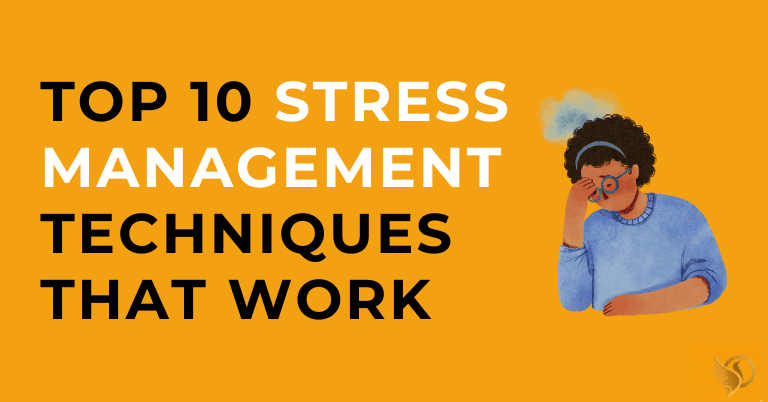There are numerous underlying reasons for stress, including family troubles, career concerns, academic difficulties, and addiction. Stress is subjective to the person experiencing it. What creates stress in one individual may have no impact on another. While stress is normal, high levels of stress connect to various mental and physical health issues.
As a result, individuals must employ stress management practices to manage the demands of daily life properly. So, what exactly is stress management, and how does one learn to control their stress?
Numerous stress management solutions try to reduce the negative effects of stress on a person’s life. If you are dealing with acute (sudden or extreme) or chronic (long-term) stress, the following list may be of assistance.
Top 10 Stress Management Techniques That Work
1. Identify why you are stressed
One of the most crucial aspects of stress management is identifying distinct stressors. It might be difficult to make lifestyle or behavioral changes without recognizing the specific life stressors.
Common stressors include the following:
- Relocating to a new residence
- Beginning a new job
- A family member has died.
- Public speaking
- Making new acquaintances
- Divorce and Eviction
- Discovering that your spouse or significant other is cheating
- Having an addiction A cancer diagnosis
There are numerous pressures in life. It is critical to recognize that some stressors are beyond a person’s control. Thus, mastering efficient stress management skills will assist a person in anticipating the unexpected and accepting what they cannot control. Some stressors are self-inflicted, which means that a person causes stress on themselves unknowingly or unwittingly. In such circumstances, stress management approaches will train people to change their attitudes and behaviors in order to reduce stress.
2. Saying ‘NO’ to what you do not like
Individuals will feel less stressed over time if they learn to say “no.” It is critical to learn to say “no” to anyone who wants a person to purposefully break their limits. This is especially crucial in the workplace, where supervisors put a lot of pressure on their employees to finish tasks or meet deadlines despite the consequences for workplace morale or detrimental impacts on mental health.
Individuals must accept that they cannot achieve everything. People have the right to say “no.” It is one thing to assist someone in need but quite another to be repeatedly taken advantage of. Individuals who struggle to establish good boundaries with others may benefit from learning when, how, and why to say no.
3. Having a Balanced Diet
That’s obvious; people like eating junk foods, but a balanced diet can put your emotions at a good level. Most of the counselors agree with this stress management technique.
It may seem counterintuitive that a person’s food might influence their stress levels. Is there a stress diet that people can follow? While there is no specific stress diet plan, there are numerous stress-relieving foods that people can try. Stress-relieving foods include:
- Walnuts
- Leafy greens with flaxseed
- Beans Oatmeal Fish
- Hummus with Yogurt
- Refined sugar and caffeine are two foods to avoid while stressed.
- Homemade Food
It is also critical that when people are anxious, they manage their blood sugar levels by eating small but frequent meals. Blood sugar fluctuations can cause mood swings, anxiety, and depression.
4. Establish Boundaries
What does it mean to draw boundary lines? Setting boundaries can be a useful stress management approach for people who are unhappy with their circumstances. A person who battles with job addiction, for example, must learn to set limits and make space for a better work-life balance. But how exactly? Individuals may have to step outside of their comfort zone and discuss work reduction with their superiors. If this talk does not go well, they should reconsider if their present job is the best fit for their mental health.
Boundaries can also be established in other aspects of life, such as romantic relationships, interactions with children, and friendships. Here are some examples of boundaries:
- Physical limitations
- Emotional barriers
- Intellectual limits
Setting healthy boundaries is an excellent stress management technique to learn what conduct is suitable and what is not. Boundaries help people manage their stress by establishing explicit limitations. You can learn to set boundaries in personality development training, which can shape your new personality.
5. Workout
Working out is one of the most effective stress relievers. Exercise and stress have an inverse relationship, which means that if a person exercises, they are more likely to reduce their stress levels. Fitness and nutrition are not only important components of a healthy physical lifestyle, but they also have a positive result on mental health. Some of the advantages of exercise for stress management include:
- Endorphin release is stimulated.
- Improves mood
- Stabilizes weight
- Boosts energy levels
- Promotes excellent sleep
6. Engage in Yoga Practice
Yoga is another ancient activity that can help people manage their stress. Yoga connects the mind and the body. People who practice yoga for stress alleviation reap numerous benefits, including:
- Lowering anxiety
- Increasing your flexibility, balance, and strength
- Relieving chronic diseases such as depression, discomfort, and high blood pressure
What exactly is yoga? Hatha, vinyasa, ashtanga, hot, and restorative yoga are all different styles of yoga that vary in origin, style, and tempo. The instructor leads a yoga session and goes through various physical poses, breathing exercises, and meditation techniques during each class. A typical yoga class lasts between thirty minutes and an hour.
8. Time Management
There are only so many hours in a day, week, month, or year. For this reason, time management and stress management go hand in hand. Time management is crucial for lowering stress levels. Procrastinating on projects or deadlines till the last minute can lead to unnecessary stress in a person’s life. Here are some time management tips:
- Organize and arrange life and work activities in advance.
- Create checklists
- Set specific and quantifiable goals (as well as deadlines for those goals).
- Tasks and events should be prioritized.
- Allow for disruptions and distractions.
- Create a reward system for meeting objectives or accomplishing tasks.
9. Connecting with Like-Minded People
It is normal to feel alone or lonely at times. When life becomes stressful, having a support system in place can assist a person in managing their stress. According to research, people who are socially isolated or lonely are more likely to have mental health and cardiovascular problems. Other studies suggest that connecting with others helps reduce the consequences of loneliness, stress, and social isolation. Individuals can benefit from a support system in the following ways:
- Making others feel loved and secure at difficult times
- Making negative feelings easier to deal with
- Boosting self-esteem
Engaging in the community is a terrific approach to meeting new people if a person is unsure about how to interact with others. Here are some ideas for connecting with others:
- Volunteering for a worthwhile cause
- Taking a lesson (for example, at a gym or an artist’s studio)
- Meeting others who share your interests in online communities
9. Have a Fun Time
Making time for enjoyment is essential, especially regarding stress relief. According to the traditional proverb, “laughter is the best medicine.” Laughter, according to science, not only stimulates the muscular and cardiovascular systems, but it can also reduce stress and muscle tension. Laughter has long-term effects on the immune system, pain management, and mood improvement.
10. Experiment with Aromatherapy
What exactly is aromatherapy? Aromatherapy is the use of various relaxing smells (essential oils) to improve health. Essential oils are extracted through distillation from plants or other natural sources. Although aromatherapy does not appear to be highly scientific, it has been demonstrated to alter the hypothalamus gland — which is located in the brain region responsible for hormonal regulation.
Here are some more Stress Management Techniques:
1. Meditation
Meditation, like yoga, is an ancient technique that connects the mind and the body. Meditation can be done alone or with the assistance of guided meditation. Many types of meditation are good stress relievers. Meditation, for example, often entails focusing attention on breathing and being aware of ideas. Recognizing thoughts and letting them go becomes simpler with practice. Meditation can help people reduce stress by assisting them in the following ways:
- Increase your self-awareness.
- Concentrate on the present moment rather than the past or the future to gain new insights into life.
- Improve your creativity
- Be more patient.
2. Music Therapy
You can give yourself time to listen to relaxing music if you are feeling overwhelmed; this way, you can become relaxed. Playing soothing music has a favorable effect on the mind, body, and spirit as it helps in lowering blood pressure and a stress hormone called cortisol.
3. Breathing Diaphragmatically
Meditation and diaphragmatic breathing share many similarities. In essence, it is a stress-relieving breathing technique. Any stress-relieving deep breathing exercise requires deep breathing into the abdomen or stomach rather than the chest. The human autonomic nervous system, which regulates the body’s involuntary activities, is activated when the diaphragm is engaged in the breathing process. As a result, people may feel more calm than if they breathed normally.
4. Muscle Relaxation
Targeting a specific muscle group and consciously tensing and relaxing that group on an occasional basis is what progressive muscle relaxation entails. As it reduces anxiety, relieves tension, and improves sleep quality, this therapy can lead to feelings of relaxation and stress management.
Get to Know Stress Management Techniques with Personality Development Training!!
Personality Development Training is a key source for balancing your inner and outer selves. At times, people may get stressed unknowingly. However, with the right training and guidance, one can be ready to face challenges in life. At ImageCoachShivani, we are offering Personality Development training, which will help you manage stress and make you a better person. The classes are conducted online and offline, and you can enroll in any one of your choice.


